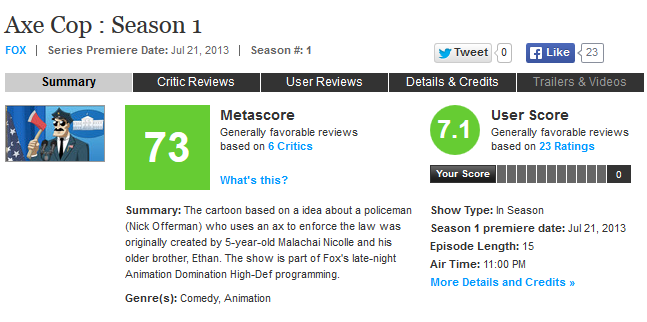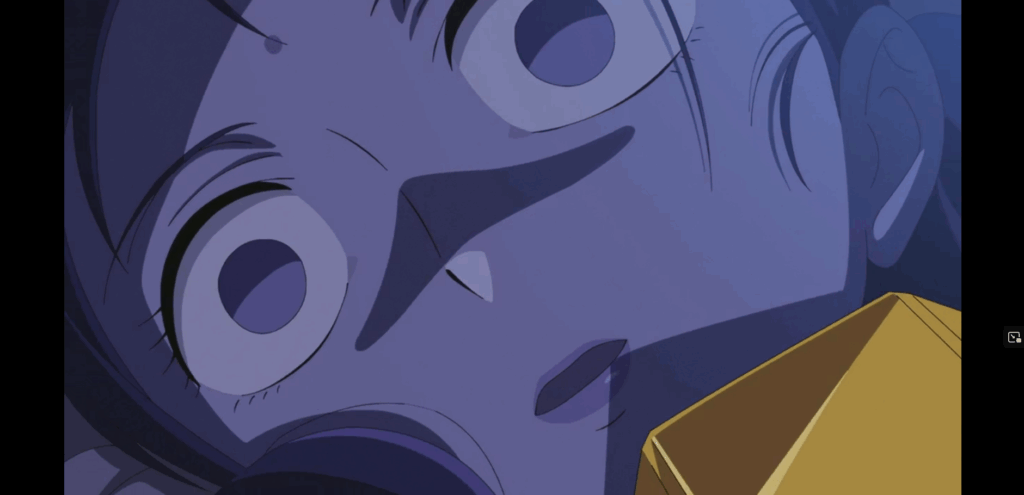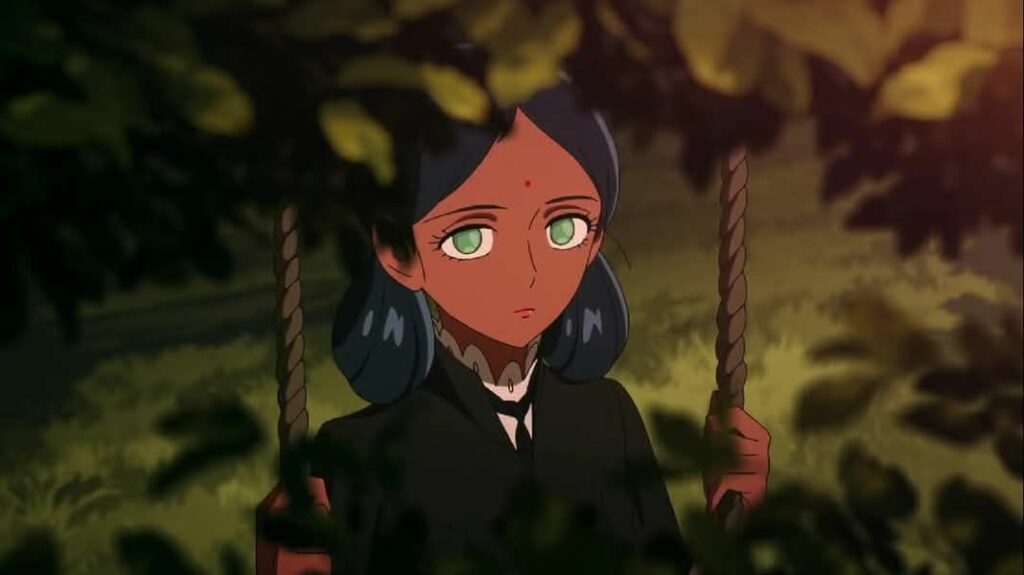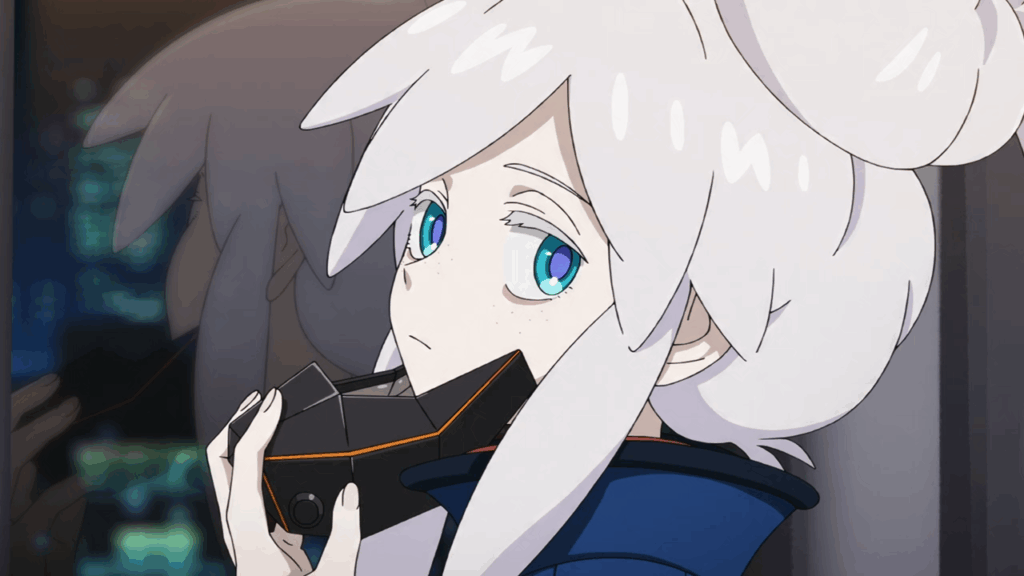There hasn’t really been much for me to write about this season, it’s pretty bland, and rather than force myself to write bullshit, I’d rather write nothing.
But I came across this on Facebook the other day and felt it was worth putting a few words in about, since the author is completely incoherent. Unfortunately, thanks to my having to understand broken English for so many years as the result of having dumb or foreign friends, I understood the message he was going for.
In order to really pull the meat off this proverbial bone, I’m going to TL;DR his major word blocks and comment on them.
Revolutionary Boy Malachai
TLDR: Malachai Nicolle, one-half of the duo that writes and illustrates Axe Cop, should be considered a entertainment genius for breathing life into animation on television where it has been stale and stagnant for years.
Don’t get me wrong, I love the concept of Axe Cop, because children are the best sources of fantasy and off-the-wall ideas, so long as you can interpret them and flesh them out, which is what his brother Ethan did. Bringing Axe Cop to television was a logical step for the two, but if you’re going to animate anything, you need the right talent behind it. Nick Offerman makes a fantastic Axe Cop, and really one of the main reasons to watch.
But Axe Cop is not a new concept to animation. Plenty of 80’s and 90’s shows did crazy wacky shit like dinosaurs and lasers and exploding things. Maybe not with a cop… with an axe, but if someone said an eight-year-old came up with the idea, well suddenly The Nicolle’s lost their raison d’être. The reason they’re bringing sexy back transitions into the next topic.
E/I, Children’s Entertainment, and You
TLDR: In the late 1990’s and early 2000’s, the US government and FCC mandated that a certain number of hours be set aside by all major networks for “educational programming”, which includes cartoons, and reduce the amount of advertising targeted to them during these shows.
All of the major networks before 2000 had probably four or five hours worth of Saturday Morning Cartoons from about 7AM to 12PM. It was a household tradition for most, myself included. But they also engaged in early-morning programming before school, as many parents had their children up before 7AM and they wanted a piece of that 5AM-8AM block. I remember my own parents barred me from watching Power Rangers in the early morning, but whenever we got carted over to the neighbors when my mother worked early shift, we got to watch stuff on their TV.
But the nanny-state government would have none of that shit. E/I aimed to cut down when broadcasters could program, and advertisers to shove their wares into children’s faces. All of the major networks abandoned cartoons and animation by the turn of the century. This gave way to The Cartoon Network’s uprise and dominance of animation in the late 90’s and early 2000’s, as more people shifted from cable networks to extended cable packages or satellite.
There is no doubt E/I killed animation in this country on television. But society has never moved past the notion that cartoons are for more than just kids. Even today, we still regard anything animated as “children’s entertainment”, and it’s frustrating as a fan of the animation medium. We’ve seen plenty of uses of the medium to tell a serious story, and yet older generations cannot get over the fact that if they’re 2D, that you’re a perverted fuck for wanting to enjoy that. Unless it’s Disney, because then that just makes you a mouse fucker. They’re apparently socially accepted.
I would actually go so far as to argue that the rise of Japanese animation in the 2000’s up until about 2008 or 2009 was the direct result of a lack of good animated programming on television. Cartoon Network did well with what came from the hands of guys like Genndy Tartakovsky, Seth MacFarlane, and Craig McCracken, but as fansubbing went digital in 2001-2002 and started to open up a portal to another fucking dimension for passive fans of the Toonami generation, everyone realized there was a great-big-universe, and we’re all really chibi.
Focus Groups Don’t Drive Fords
TLDR: Television programming is increasingly put through more regulation and oversight for things like content, marketability, projected-ratings, interest, merchandising, content verification, and other factors to ensure its success on the air and conform to FCC regulations PTA moms.
Top Gear presenter Jeremy Clarkson had probably the best line about American Focus Group testing off the heels of NBC’s attempt to market Top Gear in the US:
“[Focus Groups]…just don’t understand a single word we’re on about. They just don’t get it really.”
NBC was trying to promote their reboot of Knight Rider at the time, and it was a disaster of an attempt. They tried to make the show more about LOL ANTI-TERRORISM WITH A CAR when Knight Rider was never that concept, it was a pseudo-western about a man and his car operating outside of the law for the good of the people.
Focus Groups ruin everything about television now, because it’s essentially like having a room of twelve-year olds with ADHD trying to run around and fart in each other’s faces than tell you what they think about Yu-Gi-Oh Clone #3819382. They’ll chew through enough of these kids until they get a few that can fire more than one brain cell and offer a constructed opinion of what the show does for them and how it might improve. Rather than just load an idea in the barrel and shoot, these companies will scrap potatntially brilliant ideas in favor of making the show a watered down piece of shit so that the dumbest kid will watch and BUY ALL THE PLAYSETS AND TOYS.
Japanese animation studios, at least to my knowledge, don’t know what a focus group is. Because if they did, almost all of the shit we watch would have been rejected before it was even inked and we’d be watching the AVATAR THE LAST AIRBENDER equivalent of shows every season. This author talks about American animation’s “hey day” back in the 80’s and 90’s as if companies were willing to take more risks and come up with diverse programming. They did, because there wasn’t this allmighty “focus group” and board of executives to say “Well Test Dummy 292 said this show didn’t feature enough assess, so get us some asses in here or you’re out!”. If anything, American animation before “Big Government” and Pixar Animation was willing to look outside of their box as often as possible, as long as they could sell it. A lot of cartoons were bad though, and you can’t find them on DVD or BD today, and many more are just un-watchable, so bad that only the rosiest of nostalgia goggles can fix it.
But you shouldn’t confuse the minimal use or complete lack of “focus groups” to mean companies were less interested in marketing shit to your kids. The lack of a “focus group” in Japan today does not stop aggressive marketing of video, books, figures, body pillows, and various other objects with characters on them. A show lives or dies by its DVD/BD sales and sales of its merchandise. You’d have to be pants-on-head retarded to not realize that a show without merchandise is either so good it doesn’t need it, or so unpopular no one gave a shit. American companies know Americans have limited attention spans, especially amongst children, so for anything to succeed, it needs all the stops pulled out. Skylanders appeals to children, but also appeals to nerds who like collecting shit and remember their Pokemon days.
The author concludes this article trying to basically ask you if Axe Cop makes for a good show, given the fact the comic is written by a child. Unfortunately most of his messages are muddled between self-doubt and textbook-analysis of the entertainment industry. One line I laughed at was:
The critics don’t understand that regardless of its weaknesses in animation or in concept – the truth remains. A kid created a show in a supposed kid favored and supported genre of entertainment. And none, and I mean none of the kids networks wanted to air, the series to his peers.
What critics? Who is telling you this show is bad? Who is telling us any of this show is bad? I appreciate you are trying to delve into the reasons why cartoon programming on television in America has been shut out from expanding over the past fifteen years, give or take, but all throughout this article you keep suggesting that there are critics out there who don’t like the show or are against the fact that a child assisted his brother in the “writing” of the source material. Furthermore, you’re neglecting to mention that Axe Cop isn’t a cartoon to begin with, it’s a webcomic. The cartoon is based on the webcomic.
But since you didn’t link to any negative reviews or cite anything in that realm, I’ll do it for you using Rottentomatoes and Metacritic.
Starting with Metacritic, Axe Cop shows a 73, based on six reviews. Only one is a negative review from Willa Paskin of Slate. An excerpt:
If a 5-year-old boy were sitting in front of you and relating the events that take place in Axe Cop, you would be impressed with his imagination. But once made into an actual TV show you’re expected to watch, the limitations of even the most febrile 5-year-old’s fantasies become clear: 5-year-olds are not great on plot or one-liners and are pretty squarely still in the anal stage.
Most of this review is less to do with Axe Cop and more to do with FOX’s bid to be the next Adult Swim, which in itself is a nearly-shitty idea given how Adult Swim has ruined animation with the shittiest of animation. Only this excerpt really says anything about how the author feels about Axe Cop, and that she believes that a five-year-old’s stories don’t translate to television. Mayhaps they don’t. A lot of underlying psychology goes into shows. Family Guy does well because they play into the types of things people think are funny, even when they’re not. But the point is, if you wanted something to base your article on, you should have been using this review. From here, it is easy to say “Well I disagree with you, and here is why”. Otherwise, you’re just writing down your opinions and thoughts, and you shouldn’t be surprised when someone questions those and asks “Well, what critics were you talking about?”
Generalizations, ho!
Next, tomatoes…
Little lower than MC, 67% based on nine reviews, three of which were negative. Willa Paskin’s review is already in there, but it is joined by Brian Lowry of Variety and Joyce Slaton of Common Sense Media. Brian’s review is pretty dry, focusing more on the other show that premiered at the same time as Axe Cop. Joyce’s review however is interesting because Common Sense Media is a common name in media and entertainment, especially video games and movies. Their reviews break down elements targeting parents to inform them of the show’s content. But what is more interesting is that they approach it from a middle-viewpoint, even asking questions in the review aimed at gauging what kind of people watch this show. An excerpt from the short review:
But since (most of) the plots were formulated by a small child with a small child’s vivid imagination, passing fixations and a distinct lack of real-world logic, Axe Cop’s happenings are a lot weirder. Cartman and Stan never went into space to visit the giant dinosaur horn store to vanquish the king of all bad guys, right?
Again, here is what you should be linking to to strengthen your article, Novid. Joyce Slaton suggests in her review that this cartoon, being written by a child, transposes a child’s view of the world on top of his imagination. It’s entirely possible for dinosaurs from another planet to be helping a dude with an axe slay evil monsters. South Park was mentioned in this article, but what separates it from Axe Cop is South Park tries to convey social and political messages to a much older fanbase, using weird situations and violence as a medium. Rather, Axe Cop shares more in common with cartoons from the 80’s or 90’s that were just about wacky random things with wacky random characters.
My guess is you were trying to talk more about the “industry” and how it has changed the nature of cartoons over the past couple decades, and that is fine, but you muddled the entire message around some other threads about the cartoon itself and about supposed criticism against it without really mentioning who or what. I got the message, because it’s been a concern of mine since my Saturday Morning Cartoon days, but for most people, and I presume most of your audience, who grew up in this void of Disney-dominated programming, they’re not aware of why cartoons were something special twenty, thirty, forty, and more years ago. They don’t understand why media companies recycle old properties from long ago, like Mickey Mouse, and re-present it to newer audiences vastly different than previous iterations. They don’t even know how cheesy the old Teenage Mutant Ninja Turtles were in the 90’s and how they’re nothing like that now, forced to be grittier and edgier to placate this generation.
For you anime fans, this discussion happens every goddamn day. If E/I was the downfall of American animation, you’ll argue that “moe” was the downfall of Japanese animation. You’ll say that shows like Azumanga and Lucky Star took us down a path where we can’t get good shows anymore, only the spoon-fed drivel that KyoAni, SHAFT, or JC STAFF feed us. Hipsters and neckbeards will sit around and coon about the “good old days” of animation pre-2000 and wave their VHS and Laserdiscs around. They’ll refuse to watch anything new because they feel like they’d fall on their sword as an ambassador to REAL anime, or they’ll only watch shows no one else is watching, and bitch about how no one else is watching a “fucking masterpiece”. Trust me, this scene is similar to the American scene. Just look for the Disney/Pixar fans. They’ll tell you that nothing else stacks up to John Lasseter and Company’s stronghold over movie animation, and that everything else just “imitates” Pixar’s master race of animation standards.
Honestly, I think the entire point of this article was to highlight the incompatibilities between Americans and animation. It’s “for kids”. Not for adults. No self-respecting adult should ever be watching cartoons. Trust me, I’m thirty, and not a day goes by without someone telling me I am a manchild for wanting to watch cartoons about girls playing musical instruments. It doesn’t matter if the show is actually a comedy about people working in a restaurant, or an introspective look at children dealing with self-identity issues, it’s still a cartoon, and that means it’s for children. Same with video games. Games. For children. We’re simply not a culture that accepts two-dimensional forms of entertainment as something older people without children can enjoy. It’s a form of discrimination that goes unanswered because no one is interested in leading the charge to change. Sure, we’ve had some who have challenged the notion and made some minor victories, but the engines that this article’s author talks about are the very same engines resisting that change, because to lose children as the primary target of animation and shifting to adults, means the loss of their biggest marketing sinkhole ever. They can’t afford to lose in toy sales, and thus animation is held to the lowest of standards to placate that market.
So when you ask anime fans why they prefer Japanese animation over American animation, the answer should be simple. They support a medium that can expand beyond the scope of a child, into something anyone can manipulate and form, and subsequently enjoy.
But if they answer “because body pillows”, you probably should give Chris Hansen their address and move to Canada.
Or set them on fire.
If you live in another country besides Japan or the US and have thoughts about how your country/state/dictatorship/Principality of Zeon/box/castle/WATERWORLD ‘s society thinks about animation and children’s entertainment, I’d love to hear about it in the comments. I know anime, Disnet movies, or whatever other cartoons are shared by a lot of people worldwide, but never much is shared about its effects on local culture. Sound off like you got a pair.







